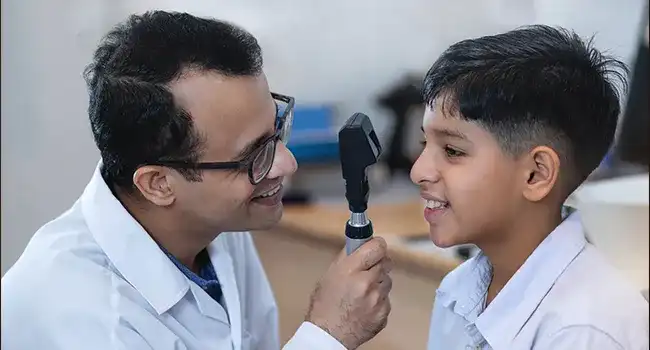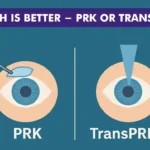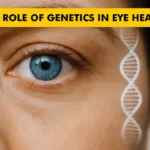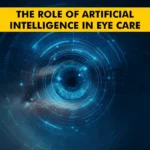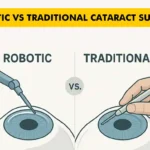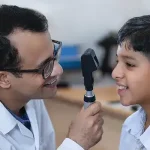Adults promptly seek medical attention when they have an eye issue. However, kids with visual issues frequently struggle to convey their discomfort. But a skilled pediatric optometrist or ophthalmologist is required to provide them with thorough care for their delicate eyes.
What is paediatric ophthalmology?
It is a branch of ophthalmology focusing on children’s vision problems, visual growth, and eye illnesses. Pediatric ophthalmologists have the knowledge and training necessary to care for your kid if they have eye issues, reading difficulties, or need surgery or medical attention for an eye condition. According to studies, vision abnormalities can contribute to children’s Attention Deficit Hyperactivity Disorder (ADHD) and learning difficulties.
Diseases that are treated under paediatric ophthalmology
The following are the most prevalent diseases that impact children’s eyesight and are treated under paediatric ophthalmology:
- Issues with refractive and optical systems like short-sightedness, long-sightedness, and astigmatism. These three conditions, sometimes referred to as refractive errors, are the most common eye illnesses in both children and adults, and they are typically caused by imperfections in the eye’s surface that prevent light from correctly focusing on the retina.
- Amblyopia, commonly referred to as lazy eye, is a disorder in which one or both eyes fail to develop normal vision due to several conditions that make the visual section of the brain operate incorrectly.
- Developmental problems are frequently identified within the first year of life or soon after delivery. Coloboma, microphthalmia, small eyes, and optic nerve hypoplasia are a few developmental abnormalities. Vision loss is a frequent complication of these disorders.
- Eye allergies and glaucoma-related eye issues. A rare illness, paediatric glaucoma can develop during childhood or in infants. Cloudy corneas, weeping, excessive blinking, light sensitivity, and redness of the eye are indications and symptoms of paediatric glaucoma.
- Diseases of the conjunctiva, the translucent membrane that covers the white area of the eye and the interior of the eyelids.
- Children undergoing cataract surgery. Although cataracts are frequently associated with older persons, they can sometimes develop during birth or in childhood. To restore normal visual development in infants and young children, early detection and treatment of cataracts are essential.
- Squint surgery for adults and children with crossed eyes such as strabismus. The term “strabismus” refers to an eye alignment disorder in which one or both eyes may be directed upward, downward, inward, or outward. If treatment for strabismus in youngsters is put off, it can lead to lazy eye (amblyopia) and result in a permanent loss of vision. Double vision is common in older people and adults.
- Children’s epiphora-related issues. Excessive eye watering is known as epiphora. Early observation of childhood epiphora is common; however, it might develop later. It usually results from a blockage in the tear drainage system when it is noticed in infants.
Why consult a paediatric ophthalmologist?
The eyes of a child are not merely a scaled-down duplicate of an adult’s eye; they grow with time. Therefore, children’s eyesight issues require specialized eye care.
At birth, every kid has a basic eye examination to rule out any developmental issues like retinoblastoma or cataracts. Most kids then undergo a fundamental vision examination as part of the school vision screening program when they are 4-5 years old. Make an appointment with your neighborhood optometrist for a sight test if you have any issues with your child’s eyes or eyesight. A specialized evaluation by a paediatric ophthalmologist may be necessary for children under the age of 5 to 6 years.
In a child’s first 12 years of life, vision is thought to be the primary factor in 80% of learning. Eyesight defects can bring on a variety of behavioral and learning issues. A child may have difficulties in school or athletics without being aware of a vision issue.
Children sometimes cannot realize that their vision is inadequate, or they fail to express their symptoms adequately. While certain eye disorders may not require active treatment because they are part of normal development, others may require immediate eye care. In certain instances, if an eye disease is not addressed on time, the child may even permanently lose their eyesight.
Some common reasons for consulting a paediatric ophthalmologist –
- Distorted or wandering eyes
- Responsiveness to light
- Squinting
- Redness, persistent pus or crust, or watery eyes
- Rubbing their eyes a lot
To properly diagnose and treat eye problems, it is crucial that trained professionals, such as paediatric ophthalmologists, inspect kids’ eyes for symptoms of eye disease.
Exactly what does a paediatric ophthalmologist do?
Children’s eye disorders are identified and treated by paediatric ophthalmologists.
Although they are not medical professionals, a pediatric optometrist can prescribe medication for specific eye ailments. When necessary, ophthalmologists can perform surgery as well as diagnose and treat all eye conditions and diseases. Pediatric ophthalmologists have experience treating kids in a way that encourages their comfort and cooperation. They use specialized equipment sized suitably for children, as well as eye tests specifically created for the child’s developmental stage.
Here are certain services that a paediatric ophthalmologist typically provides:
- Perform diagnostic testing
- Prescribe corrective lenses and eyewear
- Identify abnormalities in the visual processing
- Treats eye injuries
- Determines whether conditions including diabetes, juvenile rheumatoid arthritis, and other medical and neurological disorders are to blame for eye problems.
- Executes surgical procedures, including laser and microsurgery (for problems like weak eye muscles, wandering eyes, crossed eyes, retinal problems, blocked tear ducts, and infections)
Why CFS?
At CFS’s Eye Hospital, paediatric ophthalmology is handled professionally, with knowledgeable consultants and surgeons working around the clock to ensure that the vision of our future generation is well safeguarded. Initially, eye exercises and the prescription for pediatric glasses are used to address various eye conditions in children.
All the Paediatric Ophthalmology specialists provide the best child eye care at CFS and are skilled in treating all kinds of eye ailments.
Article: Everything you need to know about paediatric ophthalmology!
Author: CFS Editorial Team | Nov 11 2022 | UPDATED 02:40 IST
*The views expressed here are solely those of the author in his private capacity and do not in any way represent the views of Centre for Sight.
